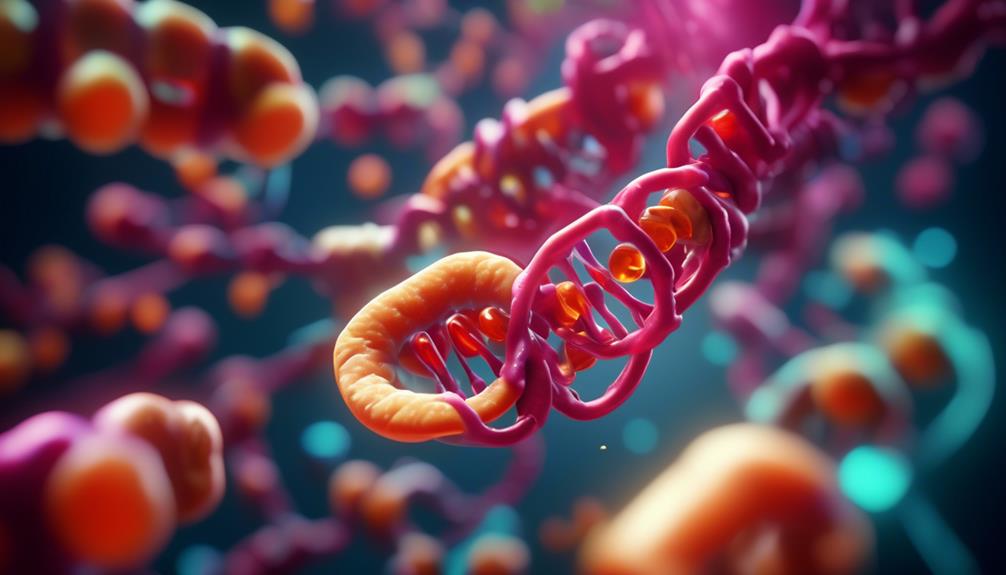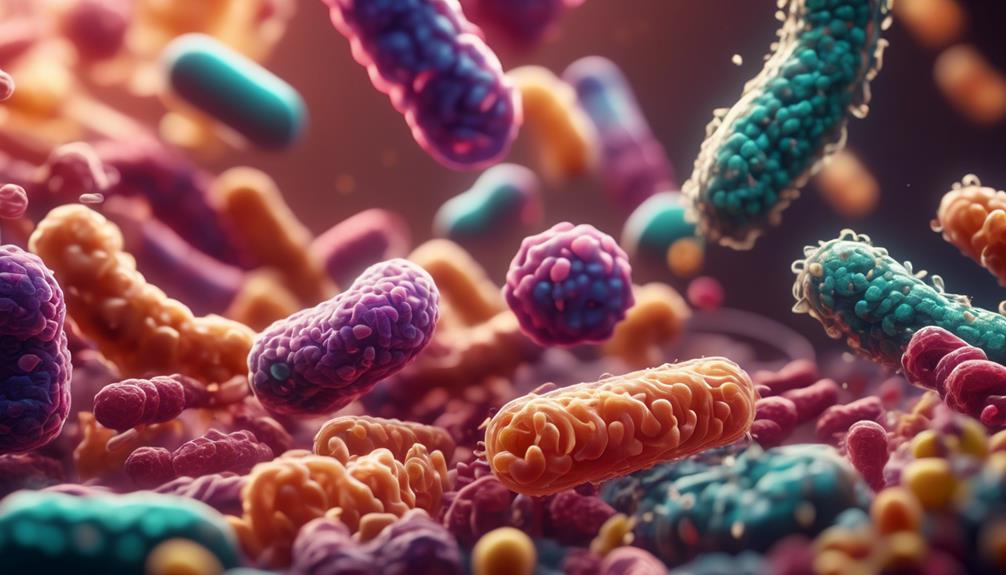Have you ever wondered why people on the ketogenic diet often experience reduced appetite?
Picture this: you start your day with a hearty breakfast of eggs and avocado, and by lunchtime, you find yourself surprisingly satisfied with a small salad instead of your usual double cheeseburger.
The mystery lies in the physiological changes that occur when you adopt a ketogenic lifestyle.
In this discussion, we will explore the fascinating mechanisms behind why keto helps curb appetite, uncovering the role of ketosis, hunger hormones, insulin levels, satiety, and even gut health.
Get ready to discover the science behind this remarkable phenomenon and gain a deeper understanding of how keto can revolutionize your approach to eating.
The Ketogenic Diet and Hunger

When following the ketogenic diet, you may find that hunger is effectively curbed. Understanding the relationship between the ketogenic diet and hunger is crucial for those seeking weight loss and improved metabolic health.
The ketogenic diet is a high-fat, low-carbohydrate eating plan that shifts your body into a metabolic state called ketosis. In ketosis, your body primarily relies on fat for fuel instead of carbohydrates. This shift in fuel source has several effects on hunger regulation.
Firstly, the ketogenic diet promotes satiety through increased consumption of healthy fats. Fats take longer to digest compared to carbohydrates, keeping you feeling fuller for longer. Additionally, fats stimulate the production of hormones that signal fullness to the brain, such as peptide YY and cholecystokinin.
Secondly, the ketogenic diet stabilizes blood sugar levels. By reducing carbohydrate intake, the fluctuations in blood glucose levels are minimized. This helps prevent sudden drops in blood sugar that can trigger intense hunger and cravings.
Lastly, ketones, the byproduct of fat metabolism in ketosis, have appetite-suppressing effects. Research suggests that ketones may directly affect the brain's appetite control centers, reducing hunger and promoting a feeling of satisfaction.
Understanding Ketosis and Appetite
Understanding the relationship between ketosis and appetite is essential for gaining insight into how the ketogenic diet can help curb hunger. Ketosis is a metabolic state in which the body primarily relies on ketones, produced from the breakdown of fats, as its main source of energy instead of glucose. This state is achieved through the restriction of carbohydrates and an increase in healthy fats in the diet.
One way that ketosis helps regulate appetite is through hormonal regulation. When following a ketogenic diet, insulin levels decrease, and the hormone leptin, which is responsible for signaling fullness, increases. This decrease in insulin and increase in leptin can help reduce cravings and the desire to overeat. Additionally, ketosis promotes the release of the hormone cholecystokinin (CCK), which is released by the gut in response to the presence of fat. CCK helps to signal satiety and control appetite.
Another aspect of appetite regulation in ketosis is related to gut health. The gut microbiota play a crucial role in maintaining overall health, including appetite control. The ketogenic diet, with its emphasis on whole foods and low sugar intake, promotes a healthy gut microbiota by reducing the growth of harmful bacteria and promoting the growth of beneficial bacteria. This healthy gut microbiota can help regulate appetite by promoting the release of hormones that signal satiety.
Impact of Ketones on Hunger Hormones

Did you know that ketones, the byproduct of fat breakdown during ketosis, can actually impact your hunger hormones?
Research has shown that ketones have the ability to suppress appetite by affecting the hormones that regulate hunger. Specifically, ketones have been found to decrease levels of ghrelin, the hormone responsible for stimulating hunger, while increasing levels of cholecystokinin, a hormone that promotes feelings of fullness.
This hormonal regulation is one of the key mechanisms by which the ketogenic diet can help curb your appetite and support weight loss.
Hormonal Regulation
The impact of ketones on hunger hormones can play a significant role in regulating appetite and promoting satiety. When following a ketogenic diet, the production of ketones increases due to the body's reliance on fat for fuel instead of carbohydrates. This shift in fuel source has been shown to influence hormonal regulation, particularly in relation to hunger and weight loss.
One hormone affected by ketones is ghrelin, often referred to as the 'hunger hormone.' Ghrelin is responsible for stimulating appetite, and studies have shown that ketones can reduce ghrelin levels, leading to decreased feelings of hunger.
Additionally, the production of ketones triggers the release of peptide YY (PYY), a hormone that promotes feelings of fullness and satiety.
Appetite Suppression
When it comes to appetite suppression, the impact of ketones on hunger hormones is a crucial factor to consider. The ketogenic diet, which is high in healthy fats and low in carbohydrates, promotes the production of ketones in the body. These ketones have been found to affect hunger hormones, leading to reduced appetite and increased feelings of fullness.
Here are five ways in which ketones impact hunger hormones:
- Ketones suppress ghrelin, the hormone responsible for stimulating hunger.
- Ketones increase the production of cholecystokinin (CCK), a hormone that promotes feelings of fullness.
- Ketones enhance the release of peptide YY (PYY), another hormone that helps control appetite.
- Ketones inhibit the release of neuropeptide Y (NPY), a hormone that stimulates appetite.
- Ketones improve insulin sensitivity, which can help regulate blood sugar levels and reduce cravings for sugary foods.
Incorporating keto-friendly snacks into your diet can further aid in appetite suppression and support weight loss efforts.
Decreased Insulin Levels and Appetite Control
Decreased insulin levels play a crucial role in controlling appetite and promoting weight loss on the keto diet. Insulin is a hormone produced by the pancreas that helps regulate blood sugar levels. It's also involved in the storage of fat in the body. When you consume carbohydrates, your body releases insulin to help transport glucose into cells for energy. However, in people with insulin resistance, the body has difficulty using insulin effectively.
On a keto diet, you restrict your carbohydrate intake and increase your dietary fat intake. This leads to a decrease in insulin levels. When insulin levels are low, it signals the body to use stored fat as a source of energy instead of relying on glucose from carbohydrates. As a result, you experience weight loss.
Additionally, decreased insulin levels on the keto diet have been shown to affect appetite control. Insulin acts as a hunger-regulating hormone, and high levels of insulin can lead to increased hunger and overeating. By reducing insulin levels through carbohydrate restriction, you may experience a reduction in appetite and cravings.
Ketones and Increased Satiety

By following the keto diet and reducing your carbohydrate intake, you can tap into the power of ketones to increase feelings of satiety and curb your appetite. Ketones are produced in the liver when your body is in a state of ketosis, which occurs when carbohydrate intake is low.
These ketones have several effects on your body that contribute to increased satiety and reduced hunger:
- Ketones suppress ghrelin, the hormone responsible for stimulating hunger. This means that when ketone levels are elevated, you're less likely to experience intense hunger pangs and cravings.
- Ketones increase the production of cholecystokinin (CCK), a hormone that signals fullness and satisfaction. This can help you feel satisfied after a meal and prevent overeating.
- The ketogenic diet promotes stable blood sugar levels, which can help regulate appetite and prevent sudden spikes and crashes that can trigger hunger.
- Ketones have been shown to increase the production of peptide YY (PYY), a hormone that reduces appetite and promotes feelings of fullness.
- The ketogenic diet has been linked to improved metabolic health, which can further support weight loss and appetite control.
Ketogenic Diet and Reduced Food Cravings
When following a ketogenic diet, you may experience a reduction in food cravings due to several factors.
Biological hunger cues, such as the hormone ghrelin, are regulated more effectively on a ketogenic diet, helping to curb your appetite.
Additionally, the increased production of satiety signals, such as peptide YY and leptin, can contribute to a decreased desire for food.
Biological Hunger Cues
The ketogenic diet has been shown to effectively reduce food cravings and enhance biological hunger cues. By following this low-carb, high-fat diet, you may experience the following changes in your appetite regulation:
- Increased sensitivity to hunger cues: The ketogenic diet helps your body become more in tune with its natural hunger signals, allowing you to better recognize when you're truly hungry.
- Reduced cravings for sugary and processed foods: By eliminating carbohydrates from your diet, you can break free from the cycle of cravings and reduce your desire for unhealthy, high-calorie foods.
- Enhanced satiety: The high fat content of the ketogenic diet promotes feelings of fullness and satisfaction, making it easier to control your portion sizes and overall calorie intake.
- Stabilized blood sugar levels: Keeping your blood sugar levels stable on a ketogenic diet can help prevent sudden drops in energy and hunger pangs.
- Improved hormone regulation: The ketogenic diet has been found to positively influence hormones involved in appetite regulation, such as insulin and ghrelin, helping to reduce excessive hunger.
Hormonal Regulation
Incorporating the ketogenic diet into your lifestyle can lead to reduced food cravings by regulating hormonal signals that control appetite.
When you follow a ketogenic diet, your body undergoes metabolic changes that promote hormonal balance, ultimately influencing your appetite.
One key hormone that plays a significant role in regulating hunger is ghrelin. Ghrelin is known as the 'hunger hormone' because it stimulates appetite. Studies have shown that the ketogenic diet can decrease ghrelin levels, leading to reduced hunger and cravings.
Additionally, the ketogenic diet increases the production of satiety hormones such as peptide YY (PYY) and cholecystokinin (CCK), which help you feel full and satisfied.
Increased Satiety Signals
By increasing the production of satiety hormones, such as peptide YY (PYY) and cholecystokinin (CCK), the ketogenic diet effectively curbs your appetite and reduces food cravings. These satiety signals play a crucial role in regulating hunger and controlling the amount of food you consume.
Here's how the ketogenic diet impacts hunger signals and neural pathways:
- Increased production of PYY and CCK helps you feel fuller for longer periods.
- The ketogenic diet promotes the release of hormones that reduce appetite.
- Neural pathways involved in hunger regulation are positively influenced by the ketogenic diet.
- The high-fat content of the diet triggers hormonal responses that signal satiety.
- The reduction in carbohydrate intake on a ketogenic diet leads to improved appetite control.
These mechanisms work together to suppress your appetite and reduce food cravings, making it easier to adhere to a ketogenic diet for weight loss or overall health.
Ketosis and Appetite Regulation in the Brain
When in a state of ketosis, the brain's regulation of appetite undergoes significant changes. Ketosis occurs when the body utilizes ketones, produced from fat breakdown, as its primary source of energy instead of glucose. This metabolic state has been shown to have various effects on brain function and weight loss.
Research suggests that ketosis can affect appetite regulation in the brain through several mechanisms. Firstly, ketones themselves have been found to have appetite-suppressing effects. Studies have shown that ketones can reduce the levels of the hunger hormone ghrelin and increase the levels of the satiety hormone cholecystokinin. This hormonal shift helps to decrease hunger and increase feelings of fullness.
Furthermore, ketosis has been shown to affect the brain's reward system, which plays a crucial role in regulating food intake. Studies have found that being in a state of ketosis can reduce the brain's response to food cues and decrease cravings for high-carbohydrate and high-sugar foods. This can ultimately lead to a decrease in calorie intake and promote weight loss.
Keto Diet and Improved Gut Health

The ketogenic diet has been shown to have a positive impact on gut health, improving digestion and promoting a healthier balance of gut bacteria. Here's how the keto diet can help improve your gut health:
- Reduced inflammation: The high-fat, low-carb nature of the keto diet can help reduce inflammation in the gut, which is often associated with digestive issues and discomfort.
- Improved digestion: By eliminating processed foods and focusing on whole, nutrient-dense foods, the keto diet provides the necessary nutrients for optimal digestion. This can lead to improved nutrient absorption and reduced symptoms of bloating and indigestion.
- Balanced gut bacteria: The keto diet encourages the consumption of high-fiber, prebiotic-rich foods like leafy greens and non-starchy vegetables. These foods promote the growth of beneficial gut bacteria, which are essential for a healthy digestive system.
- Regulated hunger hormones: The ketogenic diet is known for its appetite-suppressing effects. This is partly due to the increased production of ketones, which help regulate hunger hormones like ghrelin and leptin. By keeping these hormones in check, the keto diet can help reduce cravings and promote a healthy appetite.
- Enhanced gut-brain connection: The gut and brain are closely connected through a complex network called the gut-brain axis. The keto diet's positive impact on gut health can improve this communication, leading to better overall health and wellbeing.
Long-term Effects of Keto on Appetite Control
The positive effects of the ketogenic diet on gut health extend to long-term appetite control, making it an effective dietary approach for curbing cravings and promoting healthy eating habits. When you follow a keto diet, your body enters a state of ketosis, where it relies on fat for fuel instead of carbohydrates. This metabolic shift not only helps you burn stored fat for energy but also has a significant impact on your appetite.
One of the reasons why the keto diet helps with appetite control is its effect on biological hunger cues. When you consume a diet high in carbohydrates, your blood sugar levels spike, leading to a rapid increase in insulin production. This insulin response can cause a subsequent drop in blood sugar levels, triggering hunger and cravings. However, on a keto diet, your carbohydrate intake is significantly reduced, resulting in more stable blood sugar levels. This stability helps regulate your hunger signals and prevents the rollercoaster of cravings commonly experienced on high-carb diets.
Furthermore, the improved gut health associated with the keto diet also plays a role in long-term appetite control. The gut microbiota, which consists of trillions of microorganisms residing in your digestive system, has been linked to appetite regulation. Research suggests that a healthy gut microbiome can positively influence the production of hormones that control hunger and satiety. The keto diet, with its emphasis on whole foods and limited sugar intake, promotes a diverse and balanced gut microbiome, which may further enhance appetite control.
Conclusion
In conclusion, the ketogenic diet can be an effective way to curb appetite and promote weight loss. By inducing ketosis, the body relies on ketones for fuel instead of glucose, which helps regulate hunger hormones and decrease insulin levels. This leads to increased satiety, reduced food cravings, and improved appetite control.
So, if you're looking to control your appetite and achieve long-term weight loss, the keto diet may be worth considering. Remember, Rome wasn't built in a day, and neither is a healthy body.







